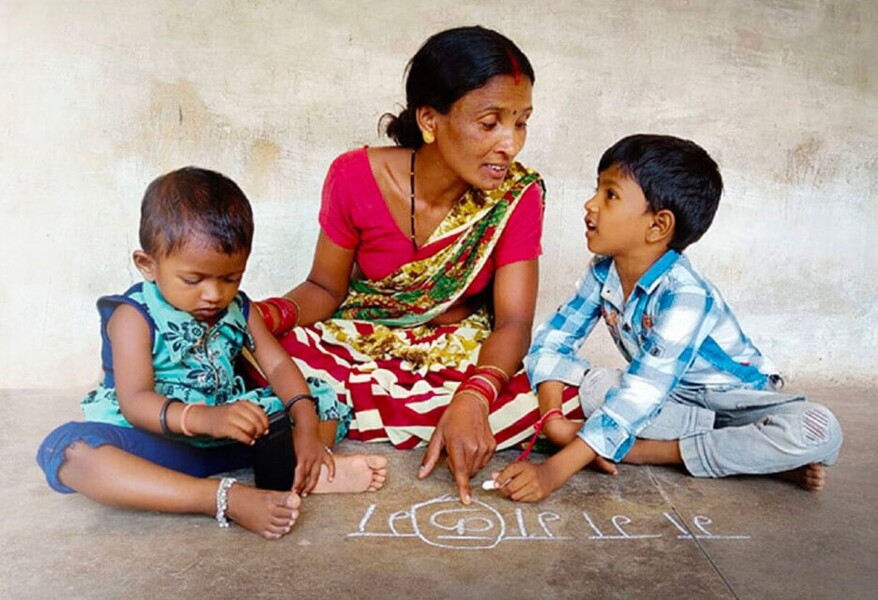Pratham CEO highlights the vital role of educated mothers in India's national literacy initiative in Indian Express, 'Expert Column'

The new National Education Policy (NEP 2020) was launched on 29th July, four years ago. One of NEP 2020’s key recommendations store to ensure that by the time children reach Grade 3, they have acquired foundational literacy and numeracy skills.
The centre launched the National Initiative for Proficiency in Reading with Understanding and Numeracy (NIPUN) Bharat Mission on 5th July 2021. The mission has seen energetic implementation in many states with a new framework for the foundational stage of education development and released well before frameworks for other stages.
This framework includes teacher training oriented towards the new goals, specially designed teacher-learning materials for use by children and teachers in early grade classrooms etc. But in addition to these in-school efforts there are a set of interlinked social and demographic trends which if leveraged could provide a boost to the NIPUN efforts.
Here we focus on parents, specifically the mothers of young children (between ages 4 an 8), to see how their contribution can help in strengthening children’s learning journeys.
Two demographic trends
School enrolment levels (between ages 6 to 14) have shown a remarkable rise in the last few decades with the launch of the Sarva Shiksha Abhiyan in 2001, school enrolment levels reached well above 90% in rural India by the early 2000s. The push for universal elementary education has meant that not only are more children getting enrolled into schools, but increasingly, a higher proportion of each cohort is completing elementary education.
The data on education levels of mothers with children between ages 4 and 8 – the target age of the NIPUN mission – show a steep rise over the last decade. According to the Annual Status of Education Report (ASER) surveys, between 2010 and 2022, the number of such mothers to have studied between Grade 5 jumped from 35% to nearly 60%. In fact, in 2010, less than 10% of young rural mothers had completed more than 10 years of schooling. By 2022, this number was well over 20%.
In states like Uttarakhand, Maharashtra, Punjab, and Haryana, 30 to 40% of mothers of young children have had schooling beyond Grade 10. In Tamil Nadu, this figure is close to 43%, which in Himachal, it is higher than 54%. Kerala top this list with almost 72% of these mothers receiving high school education.
However, young women in India are not joining the labour force at a rate comparable to the rest of the educated world. According to latest data from the Periodic Labour Force Survey (PLFS) 2022-23, the overall female labour force participation rate – LFPR shows the percentage of the population which is looking for a job – in India is only 37% (41.5% in rural, 25.4% in urban India). For women in the 15 to 29 age group, the LFPR is even lower at 24.5% (25.8% in rural, 20.8% in urban India).

Leveraging educated mothers
The economic implications of India’s low LFPR are debated in India’s public policy circles. There is undoubtedly scope for much improvement in this area.
But educated mothers provide a uniquely positioned resource for supporting young children’s learning. Although father’s education matters as well, 65.5% of young men (ages 15 to 29) in rural India are a part of the workforce, and thus, not as available to be with children.
The data outlined above suggests that due to the push towards universal elementary education, India today is in a unique position to leverage young mothers’ schooling levels as a resource and their children’s journey to acquire foundational literacy and numeracy.
The pandemic which was difficult and disruptive, has already laid the ground for this higher engagement. With schools closed for more than a year, parents – regardless of their own education levels – had to get involved in their children’s education. Before the pandemic, parents largely left the business of learning to schools.
The active participation of families, especially mothers, should be further encouraged to meet the goals of the NIPUN Bharat Mission. For young children to grow and thrive, nothing can be more powerful than teachers and mothers joining hands.
This article was originally written for the Indian Express’s, ‘Expert Column’ by Dr Rukmini Banerji, CEO of Pratham Education Foundation and Sanjay Kumar, Secretary of the Department of School Education and Literacy at the Ministry of Education for the Government of India which was published on Monday 29th July.
